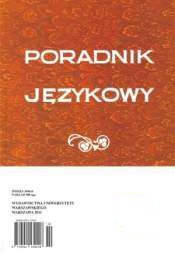DEKAPITACJA ZDAŃ WE WSPÓŁCZESNEJ POLSZCZYŹNIE. O POLSKICH ODPOWIEDNIKACH ROSYJSKICH KONSTRUKCJI BEZORZECZENIOWYCH
The „decapitation” of sentences in modern Polish. On the Polish equivalents of Russian verbless sentences
Author(s): Daniel WeissSubject(s): Language and Literature Studies
Published by: Dom Wydawniczy ELIPSA
Keywords: dekapitacja zdań we współczesnej polszczyźnie; rosyjskie konstrukcje bezorzecznikowe
Summary/Abstract: In the article I examine utterances without finite verbs in different varieties of contemporary Polish, notably in new genres of internet communication (blogs and forums), colloquial usage and narrative texts. This subject is motivated by the behavior of colloquial Russian which allows the omission of finite verbs far more freely than colloquial Polish does. The study attempts to seize some crucial factors either favoring or blocking the emergence of verbless sentences in the abovementioned Polish varieties. Anaphoric ellipsis, missing copulae and grammatical vagueness are not taken into account. The article is mainly based on data collected through Google searches and my own observation of colloquial usage. Its principal results may be summarized in the following way: 1. The omission of finite verbs is much more restricted in Polish spontaneous speech than in its Russian counterpart; we observe however the rise of new verbless structures strongly reminiscent of colloquial Russian in Polish internet communication. 2. The degree of explicitness/ vaguess or ambiguity does not seem to have an impact on the acceptability of a given construction with missing verb. 3. The narrative register proves to be more favorable for the omission of verbs of movement and communication than the discourse register.
Journal: Poradnik Językowy
- Issue Year: 2011
- Issue No: 01
- Page Range: 110-120
- Page Count: 11
- Language: Polish
- Content File-PDF

